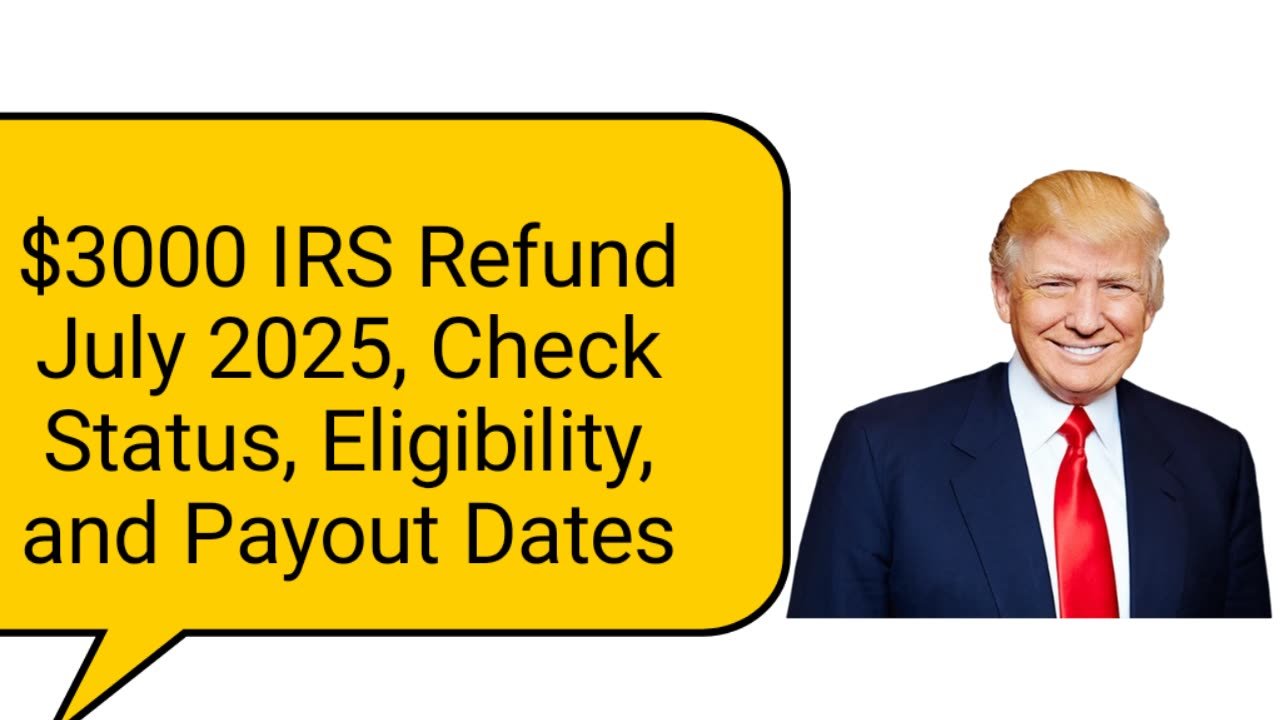$3000 IRS Refund July 2025: Check Status, Eligibility, and Payout Dates ; The Internal Revenue Service (IRS) has announced a potential $3000 refund for eligible taxpayers as part of a broader federal relief initiative. This new round of tax refunds, set for July 2025, has sparked widespread interest among Americans hoping to benefit from the payout. Whether you’re wondering if you qualify, when the payments are coming, or how to check your refund status, this comprehensive guide has all the details you need.
What Is the $3000 IRS Refund?
The $3000 IRS refund refers to a special tax relief payment initiated in mid-2025 to offer financial assistance to low- and middle-income families. This refund may be linked to excess tax payments, earned income credit adjustments, or legislative stimulus programs authorized to counteract inflation and economic strain.
Although not a traditional stimulus check, this refund functions similarly by delivering direct payments to eligible individuals based on 2024 tax filings.
Who Is Eligible for the $3000 Refund?
Eligibility for the $3000 IRS refund depends on several key criteria, including income levels, tax filing status, and dependent claims. The IRS uses the most recent tax return on file—typically your 2024 return—to determine qualification.
General Eligibility Criteria:
| Requirement | Description |
|---|---|
| Income Threshold | Single filers earning less than $75,000; joint filers under $150,000 |
| Tax Filing Status | Must have filed a 2024 federal tax return |
| Dependents | Additional benefits may apply for those with children or dependents |
| Residency | Must be a U.S. citizen or resident with a valid Social Security number |
| Back Taxes | Refund may be reduced for outstanding tax debts or federal obligations |
How to Check the Status of Your $3000 IRS Refund
Taxpayers eager to track their payment can use the IRS’s “Where’s My Refund?” tool, available on the official IRS website or through the IRS2Go mobile app.
Steps to Check Refund Status:
- Visit IRS.gov/refunds
- Enter your Social Security Number or ITIN
- Select your filing status (e.g., Single, Married Filing Jointly)
- Enter the exact refund amount you’re expecting
- Click “Submit” to view your refund status
Note: The IRS updates refund statuses once every 24 hours, usually overnight.
When Will the $3000 Refund Be Paid?
The IRS has outlined expected payout windows for the $3000 refund, beginning in mid-to-late July 2025. Most direct deposits will be processed first, followed by mailed checks.
Estimated Payout Dates:
| Payment Method | Expected Start Date | Notes |
|---|---|---|
| Direct Deposit | July 22–July 31, 2025 | Faster delivery if bank details are on file |
| Paper Check | August 1–August 15, 2025 | May take longer due to postal delivery timelines |
What If You Haven’t Filed Your Taxes Yet?
If you haven’t filed your 2024 federal tax return, it’s critical to do so as soon as possible. The IRS uses tax return data to verify eligibility and issue payments. Late filers may experience delays or miss out entirely if they miss the IRS’s deadline for processing refunds.
Common Reasons for Refund Delays
Several issues may hold up the $3000 refund, even for eligible taxpayers. These include:
- Incomplete or inaccurate tax return information
- Mismatched Social Security numbers
- Pending identity verification
- Tax offsets due to past-due debts (child support, student loans, etc.)
- Bank account errors for direct deposit
Frequently Asked Questions (FAQs)
Is the $3000 IRS Refund taxable?
No, the refund is considered a return of your overpaid taxes or a government relief payment and is not subject to federal income tax.
Can I receive the $3000 if I’m on Social Security?
Possibly. If you filed a 2024 tax return and meet the income and residency requirements, you may qualify even if your primary income is from Social Security.
What if I recently changed my bank account?
If the IRS cannot process your direct deposit, a paper check will be mailed to the address listed on your last tax return. Consider updating your information on the IRS website if needed.
Will the refund affect other government benefits?
In most cases, receiving a tax refund will not impact eligibility for SNAP, Medicaid, or other need-based federal programs.
Conclusion
The $3000 IRS refund scheduled for July 2025 offers much-needed financial relief to millions of Americans. By understanding the eligibility criteria, knowing how to check your status, and staying updated on payment timelines, you can ensure you receive your refund without unnecessary delays. If you haven’t filed your taxes yet, there’s still time—but act quickly to secure your benefits.
For real-time updates, visit the official IRS website or consult a certified tax professional.






